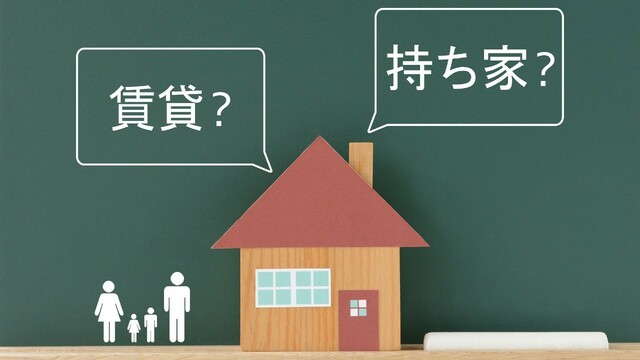Owner-occupier and rental dispute.
We compared and verified the advantages and disadvantages of both to determine which is the optimal solution.
Benefits of owning a home
- You can customize the house according to your ideal (you can decide the interior, floor plan, equipment, etc. as you like)
- If you pay off your mortgage, it becomes your property
- You can live with peace of mind when you are old
Benefits of renting
- You can move to any place you like when you want (you can live in various places)
- Housing expenses can be changed according to changes in income
- No maintenance fee
Roughly mentioned above.
So what about the disadvantages?
Disadvantages of owning a house
- can't move easily (game over if there is a trouble maker living in the neighborhood)
- If you pay off the loan by the time you retire, the burden of housing expenses will be lighter.
- Burden of maintenance costs
- Burden of property tax, city planning tax, etc.
- In the case of condominiums, repair reserves, management fees, and parking fees will continue for the rest of your life.
Disadvantages of renting
- You may not be able to renew your contract when you are old
- Renewal fee must be paid
- can't decide the interior, floor plan, equipment, etc.
- Continue to pay rent for the rest of your life
People who are better suited to owning a house
- Those who are worried about old age (In the case of a wife's eyes, if the husband should have something to do, the mortgage payment will be covered by group credit life insurance, so you can live with peace of mind)
- People who want to have assets (houses and land become assets and can be sold)
- People who want to live in a large room (you can live in a room with 4LDK or more, which is small for rent)
- People with enough savings
- Someone who could be single all the time
- People who may get cancer in the future (fully covered by group credit life insurance)
Those who are better suited for rent
- People who always want to live in the latest property (even if you buy a new building, it will be old in 10 years)
- People who have not decided where to live, such as many transfers
- People whose income is not stable
- People who have trouble getting along with their neighbors (even if there is a troublemaker in the neighborhood, you can move if you don't like it)
- Those who do not want to carry a large debt
- Those who do not want to pay property tax
Summary
Many companies have set a retirement age of 60, and even if they take advantage of the reemployment system and work until the age of 65,
Income will drop significantly, so if you choose to rent, will you be able to continue to pay your rent after retirement, and if you own a home, will you be able to complete your loan by retirement?
In the end, I personally think it depends on the life plan.
If you live for more than 40 years, it is more likely that you will save your lifetime cost if you buy it, but the situation varies from person to person.
At the crossroads of your life stage, depending on the information you choose from the 1 million pieces of information
It seems better to change it according to the situation.
Finally
By the way, I am currently renting, and if I live in Japan at the retirement age, I will buy a house with the reserves of NISA and IDECO, and if I live overseas, I think that it will be rented according to the situation.
However, if you go abroad, you will not be able to receive the benefits of NISA and IDECO, so your options will change.
Maintenance of the house seems to be difficult, so I think that if you buy it at 60, you will be able to live in a beautiful house for 20 to 30 years.
It seems that you can rent overseas or live in a hotel in Japan.
Regards,
hiro

